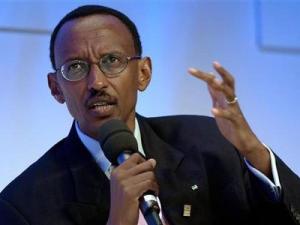Africa pushes broadband agenda via Davos
Africa pushes broadband agenda via Davos

Rwanda's Paul Kagame is to co-chair UN's Broadband Commission for Sustainable Development which brings together an influential community that just set seven ambitious yet achievable 2025 targets in support of "connecting the other half" (3.8 billion) of the world's population.
Kagame, alongside industry leader Carlos Slim Helú of the Carlos Slim Foundation, will see that the Commission engages in high-level advocacy for the promotion of broadband in developing countries and underserved communities.
The seven targets set to be achieved by 2025 were launched during the 2018 Annual Meeting of the World Economic Forum in Davos.
The targets include ensuring that all countries should have a funded national broadband plan or strategy; that entry-level broadband services in developing countries should be at less than 2% of monthly gross national income per capita; and that internet user penetration should reach: 75% worldwide, 65% in developing countries, and 35% in least developed countries.
They will also work to ensure that 40% of the world's population should is using digital financial services in the 7-year period.
This comes as a new report by the International Telecommunication Union (ITU) points that Least Developed Countries (LDCs) are recording impressive progress toward achieving increased access to information and communication technologies (ICTs).
The report, titled ICTs, LDCs and the SDGs: Achieving universal and affordable Internet in the least developed countries, analyses ICT developments in LDCs and tracks progress towards achievement of Sustainable Development Goal (SDG) Target 9.c, to "significantly increase access to information and communications technology and strive to provide universal and affordable access to the Internet in least developed countries by 2020".
According to the report, all 47 LDCs - 33 of which are from Africa - have launched 3G services and over 60% of their population are covered by a 3G network.
By the end of last year, it says the number of mobile-cellular subscriptions among these countries had increased to about 700 million with a penetration of 70% as more than 80% of their population live within range of a mobile cellular network.
It adds that the LDCs are also on track to reach on average 97% mobile broadband coverage and to make internet prices relatively affordable by 2020. While 800 million people in these countries remain offline, the report states that less than one out of four people in the LDCs will be using the internet by 2020.
However, this expected rise is not likely to impact favourably on the widespread use of the Internet by 2020 among the population of the LDCs. The report states that the ability to use the Internet will not match that of coverage and affordability due to underdeveloped human skills among many people.
ITU recommends, among others, that governments need to make the link between strategic ICT sector plans and educational policies. It also suggests that competition could be encouraged to make prices affordable and spread coverage whose obligations could be written into licences and spectrum award conditions.